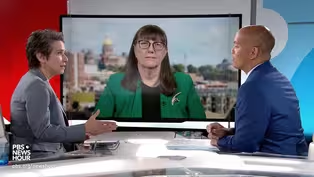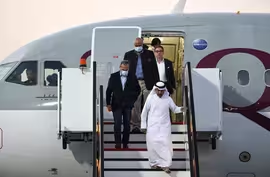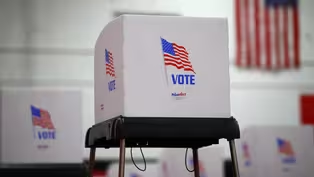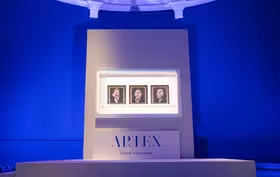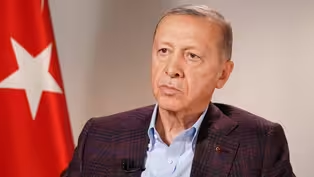
Breaking down the U.S.-Iran deal that freed five Americans
Clip: 9/18/2023 | 6m 26sVideo has Closed Captions
Breaking down the U.S. deal with Iran that freed five Americans from captivity
Five Americans imprisoned by the Iranian regime for years were released Monday in a complex deal between the U.S. and Iran. Some lawmakers have been critical of the Biden administration for making the deal, but U.S. officials have defended the agreement. Geoff Bennett speaks to Deputy National Security Advisor Jon Finer for the White House perspective.
Problems playing video? | Closed Captioning Feedback
Problems playing video? | Closed Captioning Feedback
Major corporate funding for the PBS News Hour is provided by BDO, BNSF, Consumer Cellular, American Cruise Lines, and Raymond James. Funding for the PBS NewsHour Weekend is provided by...

Breaking down the U.S.-Iran deal that freed five Americans
Clip: 9/18/2023 | 6m 26sVideo has Closed Captions
Five Americans imprisoned by the Iranian regime for years were released Monday in a complex deal between the U.S. and Iran. Some lawmakers have been critical of the Biden administration for making the deal, but U.S. officials have defended the agreement. Geoff Bennett speaks to Deputy National Security Advisor Jon Finer for the White House perspective.
Problems playing video? | Closed Captioning Feedback
How to Watch PBS News Hour
PBS News Hour is available to stream on pbs.org and the free PBS App, available on iPhone, Apple TV, Android TV, Android smartphones, Amazon Fire TV, Amazon Fire Tablet, Roku, Samsung Smart TV, and Vizio.
Providing Support for PBS.org
Learn Moreabout PBS online sponsorshipGEOFF BENNETT: And for the White House perspective, we turn to Jon Finer, President Biden's deputy national security adviser.
He joins us from the United Nations.
Welcome back to the "NewsHour."
JON FINER, U.S. Deputy National Security Adviser: Thanks for having me.
GEOFF BENNETT: And there are questions, as you well know, about what Iran is getting in exchange for freeing these five American citizens, namely, the release of nearly $6 billion in frozen Iranian assets.
The U.S. maintains that this money can only be used for humanitarian purposes, food and medicine.
But the hard-line president of Iran in a recent interview with NBC said the money will be spent - - quote -- "wherever we need it."
How does the U.S. respond to that assertion?
JON FINER: Well, first of all, thanks for having me.
The United States knows very well what's been agreed to in this deal, and that is basically the transfer of these funds from one highly restricted account in Qatar to another -- sorry -- in South Korea to another highly restricted account in Qatar, and that Iran is only authorized to use these funds for humanitarian purposes, things like food and medicine and medical devices and agricultural products.
And the United States will be monitoring the transactions that take place from this account to make sure that it's used for those purposes.
And if Iran deviates from the use that has been authorized, the United States has options to be able to freeze those funds again.
So, whatever is being said by government officials in Iran -- and, by the way, you read one quote.
I have seen other quotes from Iranian officials acknowledging that they have agreed to these humanitarian restrictions.
We know the purpose that's been authorized, and they will need to stick to that, or else we have options at our disposal as well.
GEOFF BENNETT: Can the administration guarantee that the money won't end up in the hands of Iran's elite military guard or be used to fund and arm militants across the Middle East?
JON FINER: What I can tell you is, none of these funds are going to end up in Iran at all.
These funds will be available for the authorized uses, again, just for humanitarian purposes, for Iran to make purchases like food and medicine.
But, taking a step back, you jumped sort of immediately to the funds, and I understand why that is, given some of the discourse.
But I think the bigger picture here is that there are five Americans who have been held in Iran for varying lengths of time, some going back a number of years, at least one as far back as 2016, who will now be reunited with their families and are on their way to just that sort of reunion.
The president had the opportunity to speak with those families earlier today to underscore how highly he valued the fact that they would be reunited with their loved ones.
And, for us, that is the priority, and that is the most important thing that came out of today.
GEOFF BENNETT: There are Republicans who are accusing President Biden of paying what they characterize as ransom to a world state sponsor of terrorism.
These lawmakers say that they're glad when Americans are freed from captivity, but that deals like this one only encourage hostage-taking by aggressive regimes.
What's your response to that?
JON FINER: Well, we totally reject that characterization.
For one thing, these funds are not coming out of U.S. accounts.
They're not U.S. funds or taxpayer money or anything like that.
These are Iranian funds that were held in one account being moved to an Iranian account in a different country.
And then, second, these funds are not even going into Iran itself.
They're being made available to Iran to spend, as I said, on humanitarian purposes.
So I think that characterization seems to me to be wholly misleading in terms of what these funds are and how they will be used by the Iranians.
GEOFF BENNETT: On a separate issue, more than a year of talks to restore the 2015 Iran nuclear deal, which former President Trump unilaterally abandoned back in 2018, those talks collapsed last summer.
Iran now enriches uranium closer than ever to weapons-grade levels.
Is there a hope, is there an expectation that the progress made on this prisoner issue could pave a way for progress on the nuclear issue?
So JON FINER: So, I want to be clear about a few things.
One, the United States did this deal on the merits.
We did not do it to unlock cooperation or collaboration or negotiation any other topic.
We did this to get five Americans back home and reunited with their families.
Second, we have been clear in this administration that we favor a diplomatic solution to the threat posed by Iran's nuclear program, that we favor direct negotiations with Iran, and that we favor attempts to restore nuclear -- diplomatic constraints on Iran's nuclear program that would reduce the level of threat, about which we all in the international community are concerned.
It's been the Iranians, frankly, who have not been open to those direct conversations with the United States up until now and who have been less willing to go back to the nuclear deal that was made a couple of administrations ago.
Whether or not this arrangement creates more momentum in that other conversation, it is far too early to tell, but the most important thing is that we did this on the merits and to get those Americans home.
GEOFF BENNETT: Lastly, Jon Finer, Amna spoke exclusively to Turkish President Erdogan in an interview we're set to see later on the program this evening.
And he says the U.S. sales of F-16 fighter jets to Turkey should not be linked with Turkey's ratification of Sweden's NATO membership.
He says -- quote -- "I believe these two topics shouldn't be related."
How does the U.S. see it?
Is there still a path forward?
JON FINER: Well, what I can say about this is, it is not the policy of this administration to link those two issues.
This administration has been supportive of the transfer of F-16s to Turkey.
There are a number of members of Congress who have had a different view and who have wanted to see certain steps taken by Turkey before they will either lift holds or authorize the transfer of these systems to the Turks.
We're working very closely with Congress to do just that.
But in terms of any linkage, it is not coming from President Biden or this administration.
We have been supportive of the transfer of those F-16s to Turkey.
GEOFF BENNETT: What's your expectation for when that will happen?
JON FINER: Look, I'm not going to get ahead of ongoing discussions with members of Congress or their own decision-making.
Our view is that these systems should be transferred to the Turks.
And, by the way, our view is also that the Turks should complete the ratification of Sweden's accession to NATO.
But we are not linking these issues.
We are in support of both of those steps.
GEOFF BENNETT: Deputy National Security Adviser Jon Finer, thanks again for your time.
We appreciate it.
JON FINER: Thank you.
Amy Walter and Kay Henderson on the GOP impeachment inquiry
Video has Closed Captions
Clip: 9/18/2023 | 8m 25s | Amy Walter and Kay Henderson on voter reaction to the House impeachment inquiry (8m 25s)
Five Americans fly home after years of imprisonment in Iran
Video has Closed Captions
Clip: 9/18/2023 | 10m 27s | Five released Americans fly home after years of imprisonment in Iran (10m 27s)
GOP presidential candidates court evangelical voters in Iowa
Video has Closed Captions
Clip: 9/18/2023 | 3m 13s | How GOP presidential candidates are courting evangelical voters in Iowa (3m 13s)
The pros and cons of stock markets for artwork
Video has Closed Captions
Clip: 9/18/2023 | 7m 45s | Is art a good investment? Experts weigh in on stock markets for artwork (7m 45s)
Turkey’s Erdogan says he trusts Russia as much as the West
Video has Closed Captions
Clip: 9/18/2023 | 12m 9s | Turkey’s Erdogan says he trusts Russia ‘just as much as I trust the West’ (12m 9s)
Providing Support for PBS.org
Learn Moreabout PBS online sponsorship
- News and Public Affairs

FRONTLINE is investigative journalism that questions, explains and changes our world.

- News and Public Affairs

Amanpour and Company features conversations with leaders and decision makers.












Support for PBS provided by:
Major corporate funding for the PBS News Hour is provided by BDO, BNSF, Consumer Cellular, American Cruise Lines, and Raymond James. Funding for the PBS NewsHour Weekend is provided by...
